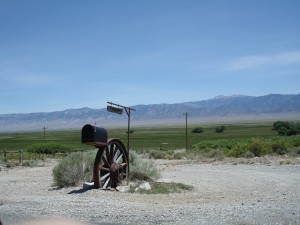“The proper and most equitable remedy”
Posted on | June 18, 2010 | No Comments

A typical entrance to a ranch in Spring Valley, Nevada. Yesterday's decision by the Nevada Supreme Court leaves 2007 awards of Spring Valley groundwater to Las Vegas standing, but calls for the reopening of a protest period that could usher in a powerful new generation of pipeline opponents. Photo: Emily Green
UPDATED: The Nevada Supreme Court yesterday issued a revision of a January ruling in which it again concluded that the State Engineer of Nevada violated due process rights of protestors by failing to hold timely public hearings on a plan by Las Vegas to tap rural groundwater. As remedy, the Court called for a new protest period that could refresh the ranks of pipeline opponents. However, the decision stopped short of voiding water awards already made to Las Vegas.
In 1989, the Las Vegas agency that is now part of the Southern Nevada Water Authority made sweeping applications to drill for rural Nevadan groundwater in dozens of basins, some almost 300 miles away. Yet hearings before the State Engineer for supplies from key valleys did not commence until 2006. By this time many protestors had been forced out of business, moved or died.
Under Nevada law, after applications for water are filed, the State Engineer publicizes the claims. After his final notice, members of the public have 30 days to register protests. Subsequently, only registered protestants are entitled to present evidence to the State Engineer at water rights hearings, which legally should take place within a year of the close of protests.
For more than two decades, those not around and awake during the 1989 window have been excluded from participating in the Las Vegas pipeline hearings. However, yesterday’s Supreme Court opinion appears to legitimize a powerful new generation of protestors. The Court concluded that “in circumstances in which a protestant filed a timely protest pursuant to NRS 533.365 and/or appealed the State Engineer’s untimely ruling*, the proper and most equitable remedy is that the State Engineer must re-notice the applications and reopen the protest period.”
Groups not among the original 1989 protestants but signatories to the appeal include the Great Basin Water Network, Defenders of Wildlife and the Long Now Foundation.
As an added twist, after the original version of this Supreme court opinion was published in January, the Southern Nevada Water Authority reflexively re-filed most of its 1989 applications. Thousands of fresh protests followed, all made within the 30 day period, including ones from the Church of Latter Day Saints and the Center for Biological Diversity.
If these recent protests are deemed valid, the Center would prove a formidable new opponent to Las Vegas, whose proposed pipeline path runs through a number of riparian habitats in the Mojave and Great Basin deserts before concluding at the foot of the Great Basin National Park. Opposition to the pipe is also rising among members of the Church of Latter Day Saints, which owns a ranch in one of the target valleys and is under pressure from Salt Lake City residents, who oppose the pipeline on the grounds that it will hasten desertification and become the source of region wide dust storms. It was church opposition that eventually scuttled a long dead plan to site MX missiles in the same region.
A new Nevada State Engineer, Jason King, who was appointed in April, will be triaging the now storied succession of applications and protests. King’s handling of the re-noticing and new protest period will be overseen by a district court in White Pine County, which in a separate October ruling voided awards for the Las Vegas pipeline from three Lincoln County valleys on the grounds that the water didn’t necessarily exist and the awards amounted to “printing more money.”
However, yesterday’s Supreme Court ruling stopped short of voiding awards for White Pine County’s Spring Valley, which was unaffected by the October ruling and is the most water-rich basin on the route of the proposed pipeline. According to the Court, “Voiding the State Engineer’s ruling and preventing him from taking further action would be inequitable to SNWA and … applicants cannot be punished for the State Engineer’s failure to follow his statutory duty.”
Both protestants and the Southern Nevada Water Authority welcomed yesterday’s decision. For the Great Basin Water Network response, click here; for SNWA’s, here.
Post script: To those who do a double take when reading the lede of the Las Vegas Review-Journal’s article today on the decision, it’s not you, it’s them. There is not a shred of truth in the line “The Nevada Supreme Court on Thursday reversed its earlier ruling that could have derailed a multibillion-dollar water pipeline for the Las Vegas Valley.” The only reversal was in the reporting of facts. To read the decision itself, click here. To read the original that it supposedly “reversed,” click here.
On a separate front, the newspaper is suing a key group of pipeline protestants for posting articles with civic news on their website without permission.
*Italics added.
This post was updated at 11.03am, 6/18/2010.
Tags: chance of rain > Great Basin Water Network > pipeline > Southern Nevada Water Authority
Comments
Leave a Reply


